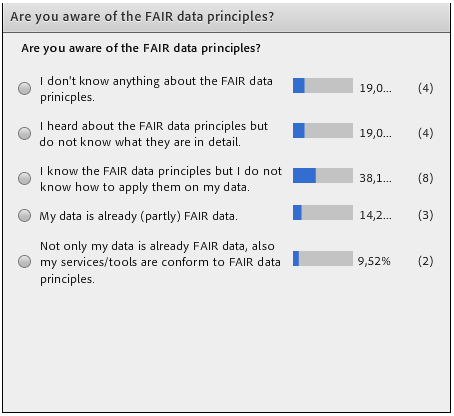Wrap Up & Materials of PARTHENOS eHumanities and eHeritage Webinar Series Webinar: How to work together successfully with eHumanities and eHeritage Research Infrastructures: The Devil is in the Details
written by Ulrike Wuttke, Klaus Illmayer, Marie Puren (21.03.2018)
Dr. Marie Puren (Inria, Paris, France) and Klaus Illmayer (ACDH-OEAW, Austria), Moderator: Ulrike Wuttke (University of Applied Sciences Potsdam),
Date and Time: Thursday, 13.02.2018, 11:00 – 12:00 A.M. CET
Materials
- View the slide set on SlideShare (PDF)
- Download the slide set from HAL (PDF).
- Download the slide set from Zenodo (PPTX).
- Watch the webinar recording on the PARTHENOS YouTube Channel.
- Watch the interactive webinar recording via Adobe Connect.
Wrap Up
This PARTHENOS webinar was dedicated to standards and data management, taking into account specific infrastructural aspects (Read the full description of the webinar). The webinar was well visited. It attracted participants from all over Europe (Germany, Croatia, Switzerland, England, Italy, France, Ireland, Netherlands, Serbia, Greece, Sweden, Estonia) as well as from the U.S., Australia and South Africa. Participants were mainly Digital Humanities Researchers, but also Cultural Heritage Practitioners, Developers and Managers and Policy Makers joined in.
Klaus and Marie introduced the participants to the advantages and practicalities of research collaboration in and with research infrastructures in Digital Humanities and Cultural Heritage research with a focus on project planning and the FAIR principles. They especially underlined in this context the importance of using standards. Klaus first talked about specific infrastructural aspects of digital eHumanities and eHeritage research related to interoperability and collaboration. He then gave an introduction into the FAIR Principles and mentioned several resources that explain how to Make Your Data FAIR, among them the new PARTHENOS training module Manage, Improve and Open up your Research and Data. Interesting were the results of his poll about the awareness of the FAIR data principles. 19% of the participants did not know anything about the FAIR data principles, 19% had heard of them but did not know what they are in detail, 38,1% of the participants knew about the FAIR principles but did not know how to apply them on their data, 14,2% stated that they already have (partly) FAIR data, and only 9,5% did not just only have FAIR data already, but also used services and tools that are conform to FAIR data principles.

Screenshot Poll 1: Are you aware of the FAIR data principles
Klaus ended his part of the presentation with central take home messages for the participants related to e-Infrastructures:
- E-Infrastructures connect you with stakeholders
- For Researchers:
- …e-Infrastructures support you
- …e-Infrastructures give you access to data for research
- …e-Infrastructures create impact for research
- For Cultural Heritage Institutions:
- …e-Infrastructures raise dissemination of data
- …e-Infrastructures enable researchers to work with data
- …e-Infrastructures deliver new insights into data
- To succeed, it requires data quality => community effort
Marie elaborated on this topic and provided more details about the role of Data Management Plans in making data FAIR and the advantages of using standards in eHumanities and eHeritage research. She introduced the Standardization Survival Kit, an interactive tool developed by PARTHENOS that is designed to help to identify relevant standards for data and metadata for the participants’ own research.
Marie ended with the central take home messages for the participants:
- For better data,
- don’t mess with the Devil…
- don’t mess with standards!
Marie and Klaus also introduced via their slides the two aliens Mork and Tork, who demonstrate playfully the intergalactic importance of using standards in a cartoon video that is available on the PARTHENOS YouTube Channel in four languages (English, German, French, Italian). You can also read a short blogpost by Vicky Garnett about the background of the videos and the makers behind the original cartoon.
Summary of the Question & Answer Session
After Klaus and Marie had given their presentation the participants were invited to submit their question to the webinar trainers who answered them live. This discussion is summarized below, including the most important links:
Question: Myriam asked when the SSK will become available.
Marie answered that the SSK will be available soon.
Question: Paul thanked Marie and Klaus for their presentation and drew attention to the fact that FAIR data do not necessarily have to be open and wondered about the difference.
Klaus mentioned in his answer that some data cannot be open, for example names are often anonymised in interviews and sometimes there is other sensitive information which should be protected, but we should try to be as open as possible. Rahul drew the attention to a graphic that illustrates the relationship between openness and fairness of data as well as to the GoFair Initiative.
Question: Dubravka asked about a comparison with the US systems in use.
In the discussion it was figured out that there is no US wide system as far as it was seen at this time because of different copyright rules. Dublin Core and other metadata standards are used.
Image Credits:
Featured Image: “How to work successfully with eHumanities and eHeritage Research Infrastructures: The Devil is in the Details”, pictures Mork and Tork Cartoon CC-BY Aghate Gastaldi

